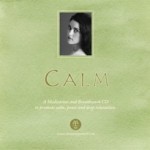 It’s nearly impossible to pay attention to one thing for a long time. A new study looks at whether Buddhist meditation can improve a person’s ability to be attentive and finds that meditation training helps people do better at focusing for a long time on a task that requires them to distinguish small differences between things they see. [continue reading…]
It’s nearly impossible to pay attention to one thing for a long time. A new study looks at whether Buddhist meditation can improve a person’s ability to be attentive and finds that meditation training helps people do better at focusing for a long time on a task that requires them to distinguish small differences between things they see. [continue reading…]
Meditation
 Maintaining a relaxed mind and body is easy if you have the tools and knowledge. All too often we get caught up in life’s every day stresses. Being able to control stress is important to our overall wellbeing.
Maintaining a relaxed mind and body is easy if you have the tools and knowledge. All too often we get caught up in life’s every day stresses. Being able to control stress is important to our overall wellbeing.
Changing your breathing is one way to change how you feel, instead of doing nothing and fretting. It can be a practical “tool” to utilize when you are feeling anxious.
We don’t very often think about how we breathe – its just something that we automatically “do”. Changing your breathing can instantly affect your mental, physical and emotional state.
However as anyone who suffers from anxiety knows all too well, it is also important to address the thinking patterns that underlie the behaviors that contribute to their emotional state.
I just spent a wonderful relaxed weekend at the lake. It was so refreshing to sit and empty my mind and watch the lapping water, free from everyday distractions and stress. I wish I could bottle that experience and take it by the spoonful whenever things get a bit “heavy”. Breathing is one way to find that experience.
 At Tri-City Psychology Services our psychologists often recommend breathing exercises to clients who are receiving therapy for anxiety/panic related disorders, so it was useful to be given the opportunity to review Sarah Casey Connell’s ‘s CD “Calm”(this is not an affiliate link). Sara had a regular column in “In Balance Magazine” and her CD “Calm”© was released last year. She’s appeared on Chicago’s Healing Arts television show and is now FOX Chicago’s sex/relationship/lifestyle expert. In her CD Sarah guides us through breathing exercises and sound meditation specifically designed to transition from a stressful mode to more balance.
At Tri-City Psychology Services our psychologists often recommend breathing exercises to clients who are receiving therapy for anxiety/panic related disorders, so it was useful to be given the opportunity to review Sarah Casey Connell’s ‘s CD “Calm”(this is not an affiliate link). Sara had a regular column in “In Balance Magazine” and her CD “Calm”© was released last year. She’s appeared on Chicago’s Healing Arts television show and is now FOX Chicago’s sex/relationship/lifestyle expert. In her CD Sarah guides us through breathing exercises and sound meditation specifically designed to transition from a stressful mode to more balance.
The CD is 45 minutes long, and is divided into three parts: the first part concentrates on grounding calming and relaxing and is good to use at the beginning of the day.The second part is effective when find yourself absolutely overwhelmed , or are feeling a deep sense of inner turmoil. The third part is good to practice before you take a nap or go to bed when you really want to be deeply relaxed .
With practice you will be able to pick and choose the meditations you like best and decide when to apply them, and not get too hung up on the idea that you have to master them all at once.
Clients who have been practicing her breathing techniques have in the main responded positively, and are learning how to apply those newly learned skills to the unwelcome emotions that have brought them into therapy in the first place.
Disclosure: Calm CD was provided by Sarah Casey Connell no reimbursement was accepted for this review.
Mindfulness meditation can change your brain in ways that support healthier, more successful relationships. But how can you meditate when your brain is so busy? Marsha Lucas, PhD is a psychologist/neuropsychologist who explains why the busier your brain is, the more opportunities you have to do the “reps” in meditation that re-wire your brain.
Source: Viddler
People who meditate regularly find pain less unpleasant because their brains anticipate the pain less, a new study has found.
 Scientists from The University of Manchester recruited individuals into the study who had a diverse range of experience with meditation, spanning anything from months to decades. It was only the more advanced meditators whose anticipation and experience of pain differed from non-meditators.
Scientists from The University of Manchester recruited individuals into the study who had a diverse range of experience with meditation, spanning anything from months to decades. It was only the more advanced meditators whose anticipation and experience of pain differed from non-meditators.
The type of meditation practised also varied across individuals, but all included ‘mindfulness meditation’ practices, such as those that form the basis of Mindfulness-Based Cognitive Therapy (MBCT), recommended for recurrent depression by the National Institute for Health and Clinical Excellence (NICE) in 2004. [continue reading…]
